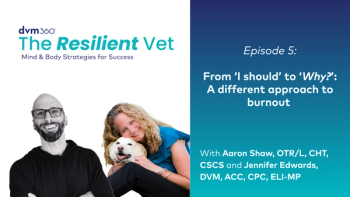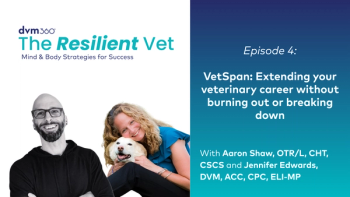
Hey, baby
Juggling a career and kids may seem impossible. But with a little thought and planning, you can bring a baby onboard-and still keep your head above water.
SO, YOU'RE THINKING ABOUT HAVING KIDS? Well, I'm going to give it to you straight—it's more difficult than spaying a hundred deep-chested, fat-storing, ovary-clenching shepherds. It's a finer balancing act than regulating a bevy of diabetic, cushingoid, yippy-yappy schnauzers. It could be more frustrating than being walloped by a herd of walk-in ADR appointments on a busy Saturday morning. And it yanks your heart around more than a kennel full of old-dog-best-dog euthanasias.
Now why would a young veterinarian in her right mind even consider starting a family if kids are that much work? I'm going to give it to you straight once more: It is, by far, the most wonderful and fulfilling thing you'll ever do.
Tough timing choices
The first question a busy, professional woman needs to ask herself is: "When do I want this most wonderful event to occur?" Of course, right on the heels of that question you'll be asking, "Where do I find the time, the energy, and the money?"
Some women decide to have children while attending veterinary school, and gulp back morning sickness as they cram for the parasitology exam. The financial aspect of childcare may not be as significant because you're already doing the how-poor-can-you-go vet school limbo. And since students are used to being on a tight budget, it might not be difficult to cut back a bit more. What might get tricky, however, is trying to plan for the birth to occur the day after finals.
I know other veterinarians who chose to have a baby the summer after they graduated, then they chewed their nails and wondered whether they'd be able to find a job after all of their classmates moved on. One advantage, of course, is that you don't need to arrange maternity leave. But you may feel less comfortable with your medical skills after a long break and no previous experience.
The wonder years
Still other women wait five, or even 10, years after graduation to start families. These women have begun to establish their careers and may have more job flexibility due to a proven track record with a clinic. On the other hand, they'll always be one of the oldest (and perhaps most tired and stiff) moms in the neighborhood playgroup. Not to mention the fact that they might be chasing toddlers when their peers are planning graduation parties.
In addition, there's a chance that women who delay having children might be forced to march to the erratic beat of their own biological clock. As the age of the mother increases, so does the possibility of complications with fertility, pregnancy, and childbirth.
Another timing issue to consider is the time of year. Life's full of surprises, so you can't count on your rigid planning working out in this area! Still, if you could have your way, there are better and worse times to be a new parent and a veterinarian.
For instance, having a baby in May is wonderful—the birds are singing, the flowers are springing up and nursing at 5 a.m. doesn't seem so awful if you can at least watch a sunrise. March and April, however, are traditionally busy months in a veterinary clinic, so keep in mind that you'll be doing a lot of bending and lifting with a very full girth. Also, you'll be sorely missed if your maternity leave begins before things slow down at the clinic.
Consider child rearing costs
Sometimes even the savviest businesswoman can get caught up dreaming about puppy dog tails and little pink bonnets and forget all about the costs of having a baby. When you're ecstatic—or perhaps dumbfounded—by that first positive pregnancy test, it'll probably cross your mind that in nine months you will be missing six to 12 weeks of work. "Ah, no problem. We can afford that," you say. But what you might be forgetting is that when you return to work you'll need to pay someone to take care of little Junior.
Children are expensive from the moment they pop their little heads out to the time they fling that graduation cap in the air. When my three kids were young, I did the math and figured out that I didn't start actually making money until after 2 p.m.—I was working to pay for daycare the entire first part of the day.
Dear Dr. Wheeler
For this reason, some couples put off moving into a bigger house or buying a newer car until a few years after the baby arrives. This can ease the financial pressure on a new mother when it comes to the length of her maternity leave and in arranging her work schedule when she does go back.
Address safety issues
A pregnant veterinarian must find a workable balance between what's ideal and what's realistic. A solo practitioner with a single assistant will probably need to help with radiographs even if she knows it would be best to totally avoid exposure, so she covers herself with lead and never holds the film cassette. On busy days there might not be anyone else available to help hold a fractious pet, so the wise pregnant veterinarian embraces the wonders of chemical restraint and avoids bite and scratch wounds whenever possible.
Toxoplasmosis. Listeriosis. Salmonellosis. Oh, my, there are a lot of bad things out there, and the list goes on. Brucellosis, leptospirosis, chlamydiosis, and VEE can all either directly or indirectly harm your fetus, so you'll need to take steps to minimize your exposure to these diseases. Stay current on your tetanus and rabies vaccines. Don't handle pesticides, hormones, or chemotherapeutics unless absolutely necessary. Wear gloves and other protective clothing to prevent contact. Use caution around anesthetic gases, and ascertain that machines and scavenger systems are in proper working order.
In addition, know where your clinic keeps it's Material Safety Data Sheets (MSDS) manual. Read about other occupational hazards at
Managing your maternity leave
Most of us have become accustomed to busy lives and busy practices where we interact a hundred times a day with clients and co-workers. Now suddenly it's just you and this little tiny baby—all day long. Oh, the baby's cute, no doubt, but it doesn't talk and it doesn't walk and it cries a lot, and there comes a moment where you just want to go into a closet and bawl your own eyes out. Hang in there—you will survive!
On the other hand, don't just hang there—the end of a rope isn't a fun place to be. There are things you can do to help yourself grow as a woman and as a veterinarian while you face these new challenges. For example, get out of the house. Bundle up that little baby and go. (No excuses! I strolled my December baby through an entire Minnesota winter.)
Eighty percent of women experience some degree of the "baby blues," and getting out and about often helps. Go visit somebody. Anybody. Sign up for mother/baby classes through your community. Walk the mall or the park paths; look for other moms and ask them if they want to start up a mom's group with you. I can't stress enough how much it helps to hear that other women are going through the very same things that you're going through, too.
It's also important to stay in touch with the clinic during this time—for both you and the staff—so take the baby by for a visit. Check in on some of your chronic cases. Attend staff meetings. Let little Junior doze in the office while you get up to speed on the new computer software updates. When you're at home, catch up on your journal reading and surf veterinary Web sites. Your brain doesn't have to go to mush just because your abdominal muscles did.
Everyone will have his or her own opinion about how much maternity leave you should take. Most women take six to 12 weeks, but some take years off after they have a child. To help you decide, consider how much time off you can afford, how easily other doctors can cover for you, and when daycare becomes available.
One very important thing to remember: You really don't know how you'll handle leaving the baby and going back to work until it actually happens. Some enjoy the adult interaction again, others feel anguish and wish desperately that they could stay at home. One thing I can guarantee—you'll feel guilty both when you're at home and when you're at work. Guilt is the curse that shackles the joy of every working mother.
Getting back to work
Every working mother needs three things to be successful. First, you need a "partner in parenting." This could be a spouse, ex-spouse, parent, or grandparent. You cannot do it alone. Second, you need a supportive employer. Is a part-time schedule an option? What if the baby's sick? Can you bring the kids to work? If your employer thinks flexibility is a four-letter word, you may be forced to add "find different job" to your to-do list. Finally, you'll need excellent childcare. Not "OK" childcare. It has to be great, because even with great daycare you'll be a basket case—at least initially.
A big decision for many women is whether to work full-time or part-time. One important consideration is how much income you need to generate. Certainly a woman with a working spouse has more flexibility in this area than a single mother. You also need to look at things like benefits (which may not be available in a part-time position) and flexibility of hours (can other doctors pick up the slack?).
Choosing to work part-time initially doesn't mean you'll follow that schedule forever. Babies grow up, kids gain independence, and mothers adjust their work habits to fit the current season of their life. The most important thing to remember is that the number of hours you work per week doesn't indicate how successful and capable a veterinarian you are. A balanced lifestyle and good mental and physical health give you the greatest chance of becoming the very best person that you can be.
And finally...
Remember, many other Dr. Moms have successfully gone before you. The most important issues are deciding what options work best for you financially and personally, staying safe during pregnancy, and keeping the lines of communication open between you and your employer. Let other people help you, and don't forget to take time for yourself. If your own battery runs low, you won't be able to power anyone else through the day, either.
And once the baby comes—enjoy! Just like our canine patients, babies lose their "puppy breath," get big feet, and then grow up and want to run off-leash all too soon.
Editors' note: How have you balanced kids and a career? Share your thoughts and tips with colleagues at
Karen Wheeler
Dr. Karen Wheeler is a writer, mom to three teenagers ages 14, 15, and 16—who creatively find ways to add new gray hairs to her head every day—and an associate practitioner at Companion Animal Hospital in Eagan, Minn. Please send questions or comments to
Newsletter
From exam room tips to practice management insights, get trusted veterinary news delivered straight to your inbox—subscribe to dvm360.




